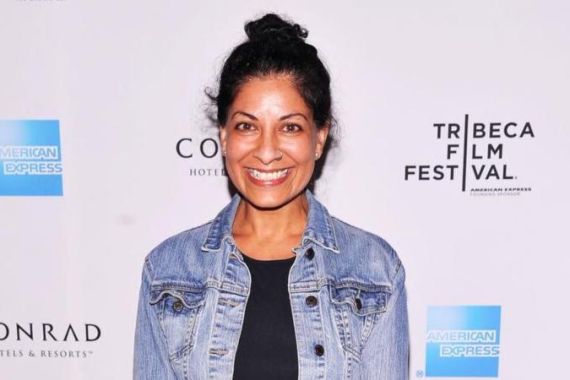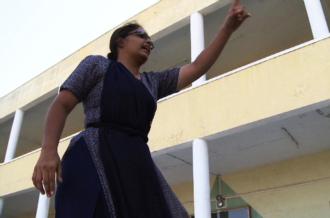Film shows two worlds of Indian women
Documentary recently released follows beauty pageant hopefuls and Hindu right-wing training camp for girls.

New Delhi, India – A ground-breaking documentary, recently released in India two years after being shown at international film festivals, reveals armed training being given to Indian teenage girls of a Hindu right-wing group and contrasts it with the national beauty pageant, Miss India.
Film-maker Nisha Pahuja shot footage inside a training camp of the Durga Vahini that shows girls being taught to use rifles as they issue bloodcurdling chants.
Pahuja has revealed to Al Jazeera how she struggled to get the film screened as India held elections in which the Hindu nationalist Bharatiya Janata Party (BJP) scored a landslide victory – and feared it would be banned.
“Most people in India aren’t aware that such camps exist and the Hindu right would like to keep it that way,” Pahuja told Al Jazeera.
Weapons training
“Ask for milk we’ll give you rice pudding. Ask for Kashmir, we’ll slit your throats,” the teenage girls shout at a summer camp in India’s western state of Maharashtra.
It was these scenes of them undergoing weapons training that Pahuja believed could result in a ban on “The World Before Her” after the film’s premiere on June 6.
She shot the footage at a training camp for the Durga Vahini, the female youth wing of the Hindu nationalist organisation Vishwa Hindu Parishad (VHP).
 |
| Film-maker Nisha Pahuja shot footage inside a Hindu right-wing training camp of the Durga Vahini that shows girls being taught to use rifles [Mrinal Desai and Derek Rogers/ Courtesy “The World Before Her”] |
Pahuja became the first person to gain permission to film inside a camp after spending two years gaining the trust of the organisation’s leaders.
She had initially wanted to make a documentary about the Miss India beauty pageant but found her attention drawn to the Hindu right after researching opposition to the contest.
The World Before Her therefore contrasts Durga Vahini with Miss India to reveal how women from both worlds struggle in India’s male-dominated society.
It shows feisty Durga Vahini youth leader Prachi Trivedi, 24, brushing off criticism of the camp as a fighter training ground.
“We don’t have AK-47s,” Trivedi says, but later adds she would make a bomb, “if the condition comes”. Another girl talks about being “proud” she has no Muslim friends.
By contrast, Miss India contestants are shown being pressured into having botox injections and parading in bikinis with white sheets covering their heads so that a male pageant organiser can judge their legs without being “distracted”.
Pahuja’s film won best documentary when it premiered at the 2012 Tribeca Film Festival in New York – yet she struggled to get it screened in India.
“The film was too controversial for some of the big distributors,” she said. “There were lots of festivals who wouldn’t show it and lots of people who I approached who wouldn’t take it on, though they liked the film.”
Pahuja added that India’s Central Board of Film Certification paused to “freak” before approving the documentary with minor changes.
She finally managed to get the movie released in India with the backing of one of India’s famous directors, Anurag Kashyap.
Hindutva ideology
The conservative Hindu ideology, Hindutva, envisages India as a culturally Hindu state and its followers are known for going to great pains to defend their ideas.
Books have been banned, school texts altered, movies boycotted and plays attacked in the name of this ideology. Of 52 cases of censorship reported in the first three months of 2014 by media monitor website The Hoot, Hindu right-wing groups were the second biggest culprits, behind the Indian state.
 |
| Miss India contestants are shown being pressured into having botox injections [Mrinal Desai and Derek Rogers/ Courtesy “The World Before Her”] |
India’s artistic community was particularly tense when Pahuja was trying to launch her film before the May polls because many of BJP’s party members are also members of these right-wing groups.
After all, India’s new prime minister, Narendra Modi, earned his ideological stripes in a Hindutva organisation, the Rashtriya Swayamsevak Sangh, as a child.
Shiladitya Bora, general manager of cinema chain PVR which is screening “The World Before Her”, said he was nervous until VHP leaders saw the film.
“I was a little worried until before the film was released, but then it started and then these guys watched the film and they liked the film, and then nothing happened,” said Bora.
The documentary has become PVR’s most successful yet, with screenings extended to more cities.
Pahuja believes the film was well received because she did not sensationalise the material.
“It’s so easy to just simply demonise them because you know for a lot of people their political beliefs are so problematic but… it’s important to understand why these forces exist, or why these belief systems exist, as opposed to just criticising the fact that they do,” she said.
She plans to take the film on tour in rural India to raise awareness about women’s rights.
Fringe Hindu groups are emerging to counter conservative elements in other religions following a spurt in domestic attacks within India, according to Animesh Roul, director of Delhi’s Society for the Study of Peace and Conflict.
“Vigilantism within certain sections of the Hindu community is increasing, and primarily for religious insecurity developed within that section which perceives that Islam and to some extent Christianity are posing a threat to Hindu existence,” Roul said.
He added that nobody should feel threatened by Durga Vahini given its priority not to fight other religions but “protect their own”.
“So-called Hindu extremism does not threaten the integrity of India rather it attempts to protect Hindu beliefs, traditions and customs,” said Roul. “The only wrong is the use of violence.”
India’s home minister and president of the BJP, Rajnath Singh, did not respond to a request for comment while Durga Vahini leader Malaben Rawal said she was unavailable to talk.
In June, Hindu right-wing groups made headlines when riots broke out in Pune, Maharashtra, after derogatory images of a deceased right-wing leader were spread on social media and led to the death of a Muslim man. The state government is now examining whether to ban Hindutva organisation Hindu Rashtra Sena, members of which were behind the attacks.
The nervousness that these groups create is perhaps best expressed in the wide-eyed, deadly serious stare of Miss India coach Sabira Merchant.
She tells Pahuja in the film: “They’ll come after your family, they’ll come after you – be careful of that.”
Follow Alys Francis on Twitter: @allyalamode